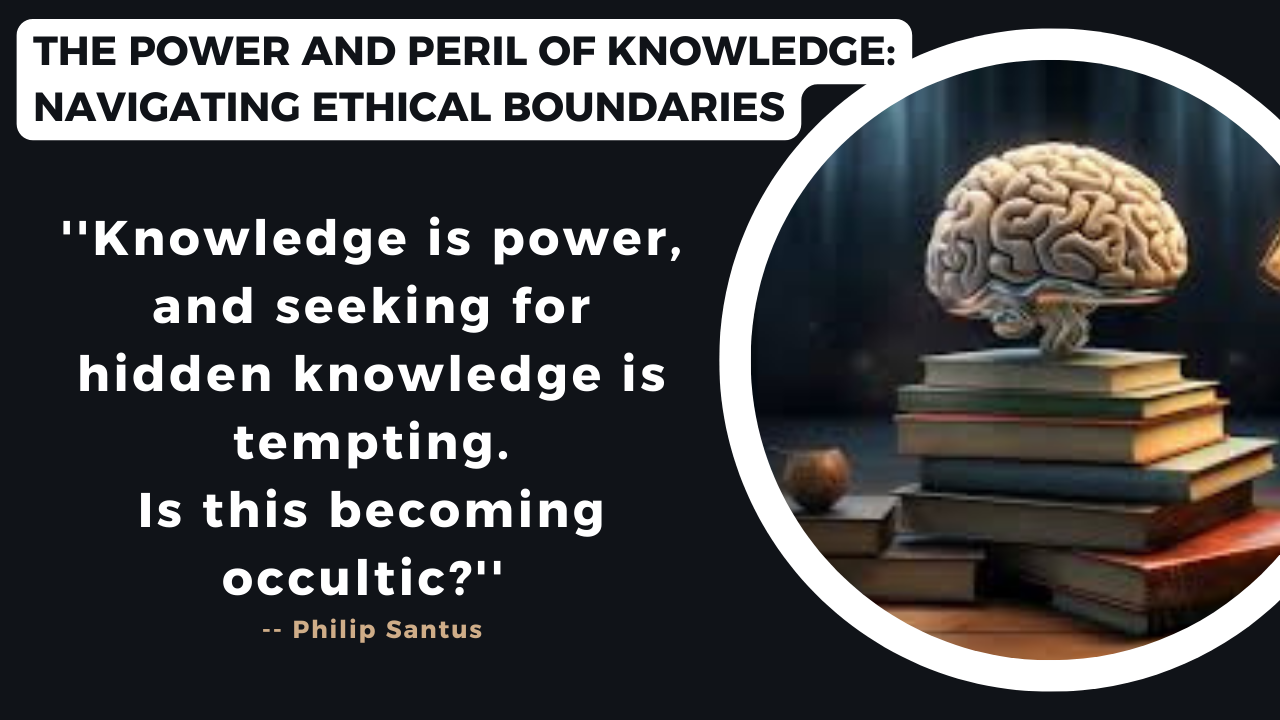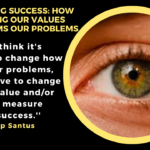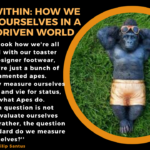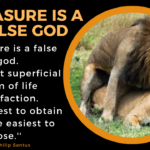The Power and Peril of Knowledge
(MY QUOTE)
”Knowledge is power, and seeking for hidden knowledge is tempting.
Is this becoming occultic?” — Philip Santus
THE MEANING AND IN-DEPTH ARTICLE:
This quote, suggests a nuanced reflection on the nature of knowledge and its ethical boundaries. Let’s break it down into sections and explore the implications, solutions, and relevant biblical perspectives that can guide a balanced approach to knowledge.
1. “Knowledge is power”
This phrase is widely recognized for its truth. Knowledge gives individuals the ability to make informed decisions, exercise control, and exert influence over circumstances. It can lead to positive outcomes, like personal growth, social improvement, and the fulfillment of one’s purpose.
Biblical Perspective:
- Proverbs 24:5: “A wise man is strong, and a man of knowledge increases power.”
- Solution: The Bible encourages wisdom and understanding but emphasizes that true strength lies in godly wisdom. Seeking knowledge should align with seeking God’s wisdom and ways, allowing power to be used for righteous purposes.
2. “Seeking for hidden knowledge is tempting”
Hidden knowledge can refer to obscure or secretive information not readily accessible or not immediately understandable. The desire to uncover hidden truths can be alluring, often sparking curiosity to seek answers beyond the ordinary. However, this pursuit can also veer into questionable or forbidden realms if not checked.
Biblical Perspective:
- Deuteronomy 29:29: “The secret things belong unto the Lord our God, but the things that are revealed belong unto us and to our children forever.”
- Solution: We’re encouraged to respect the limits of what God reveals, focusing on what is useful and righteous. The solution is to differentiate between what God reveals for our edification and what might lead us into unhealthy or prideful pursuits.
3. “Is this becoming occultic?”
The term “occult” refers to knowledge or practices hidden from ordinary understanding and often connected to mystical or supernatural influences outside of divine guidance. In this context, the question addresses the risk of crossing into areas of knowledge that may be spiritually hazardous or morally compromising.
Biblical Perspective:
- Isaiah 8:19: “When someone tells you to consult mediums and spiritists, who whisper and mutter, should not a people inquire of their God? Why consult the dead on behalf of the living?”
- Solution: When faced with an attraction to hidden or mysterious knowledge, scripture advises believers to turn to God rather than practices that pull away from Him. This guidance ensures a reliance on God’s wisdom and helps us remain within spiritually safe boundaries.
Summarized Solutions and Practical Applications
- Seek Wisdom That Aligns with God’s Principles: The pursuit of knowledge should be anchored in values that align with God’s teachings. Proverbs 2:6 reminds us, “For the Lord gives wisdom; from his mouth come knowledge and understanding.” Approaching knowledge with humility and an open heart to God’s direction keeps us grounded.
2. Embrace Transparency and Integrity in Knowledge: If we seek knowledge, we should do so with openness and integrity. 1 Corinthians 4:5 tells us, “He will bring to light what is hidden in darkness.” This reinforces that truth-seeking should avoid secrecy or deception.
3. Rely on Discernment and the Holy Spirit: For believers, the Holy Spirit is a guide in discerning beneficial knowledge from what might be harmful. John 16:13 says, “When the Spirit of truth comes, he will guide you into all the truth.” Seeking guidance from the Spirit fosters a discerning approach to knowledge.
Final Reflection
The allure of hidden knowledge is natural, yet the pursuit must always be tempered by discernment and an awareness of its spiritual implications. In this quote, the challenge posed by Philip Santus emphasizes an important ethical boundary between constructive knowledge and the potentially harmful paths that certain forbidden knowledge may lead to. Recognizing this boundary aligns with biblical wisdom, encouraging us to seek knowledge that builds rather than leads us astray.
Here are five insightful books related to the themes in the quote by Philip Santus, exploring knowledge, wisdom, spirituality, and the ethical boundaries of seeking hidden truths.
1. “The Pursuit of God” by A.W. Tozer
- Overview: Tozer’s classic work is a call to deep spiritual awareness and to prioritize seeking God above all other knowledge. He addresses how the pursuit of godly wisdom differs from human curiosity, stressing that true power and fulfillment come from knowing God personally.
- Relevance to the Quote: Tozer challenges readers to seek understanding and spiritual fulfillment through God rather than through hidden or secular knowledge, aligning with the quote’s caution against occultic practices.
- Key Insight: The power of knowledge is transformative when it is rooted in God’s truth, rather than in self-serving or occult practices.
2. “Knowledge of the Holy” by A.W. Tozer
- Overview: In this book, Tozer explores the attributes of God, emphasizing that true wisdom and power are found in understanding His character. He argues that knowledge of God is the highest form of wisdom, contrasting divine knowledge with occultic or esoteric pursuits.
- Relevance to the Quote: The book redefines power as being rooted in spiritual knowledge and warns against the allure of hidden knowledge that is disconnected from God’s holiness.
- Key Insight: Tozer emphasizes that true understanding and strength come from a reverent knowledge of God rather than from seeking power through secular or hidden knowledge.
3. “God’s Wisdom for Navigating Life” by Timothy Keller
- Overview: Keller’s book focuses on the book of Proverbs and its guidance on living wisely in various areas of life, including the pursuit of knowledge. He discusses the dangers of prideful knowledge and how God’s wisdom differs fundamentally from secular or occult knowledge.
- Relevance to the Quote: Keller addresses the temptation to pursue knowledge for self-empowerment, urging readers to seek wisdom in ways that align with God’s principles rather than occultic or worldly paths.
- Key Insight: Wisdom rooted in biblical principles safeguards against the seduction of hidden or forbidden knowledge, providing true guidance for life.
4. “Mere Christianity” by C.S. Lewis
- Overview: Lewis discusses various aspects of Christian belief, including the nature of good and evil, truth, and the power of faith-based knowledge. He warns against the pursuit of knowledge for power alone, emphasizing humility and the role of God as the ultimate source of truth.
- Relevance to the Quote: Lewis critiques the human tendency to seek power through knowledge without moral accountability, a theme directly relevant to the quote’s concern about occultic pursuits.
- Key Insight: Knowledge becomes dangerous when detached from moral and spiritual responsibility; true knowledge is that which leads us closer to God.
5. “Discernment: Reading the Signs of Daily Life” by Henri Nouwen
- Overview: Nouwen’s work on discernment teaches readers to recognize God’s voice and differentiate it from other influences, including deceptive or occultic paths. He explores how spiritual discernment protects us from being misled by the allure of secret knowledge or hidden truths.
- Relevance to the Quote: This book provides guidance on how to navigate the temptation of hidden knowledge by cultivating spiritual discernment, which is critical in distinguishing godly wisdom from occult influences.
- Key Insight: Nouwen emphasizes that discernment, rooted in a relationship with God, is essential in guiding one’s pursuit of knowledge and in resisting occultic temptations.
Each of these books offers insights into the ethical and spiritual boundaries around the pursuit of knowledge, grounding wisdom in faith and cautioning against the allure of occultic or forbidden knowledge. They address the importance of seeking truth within God’s framework, providing both philosophical and practical guidance.






